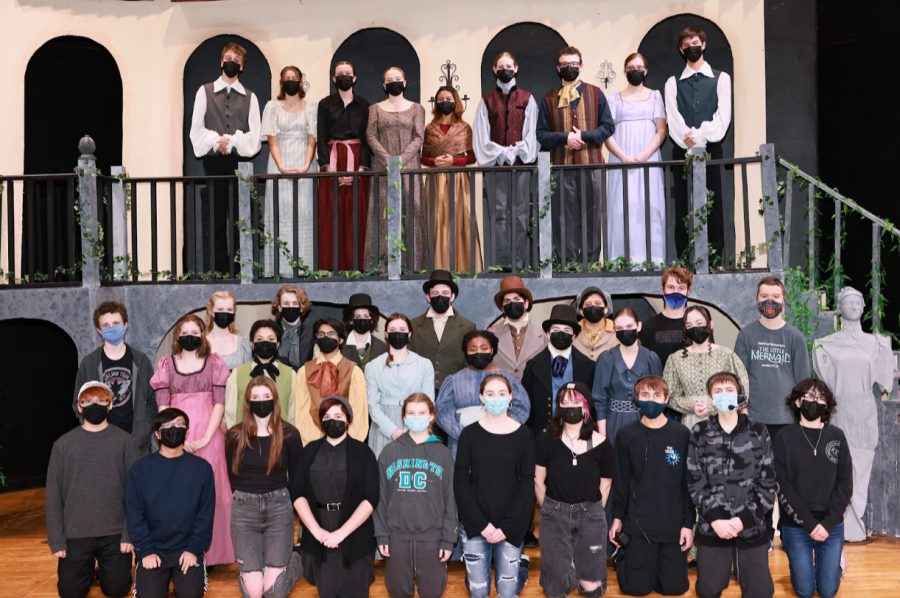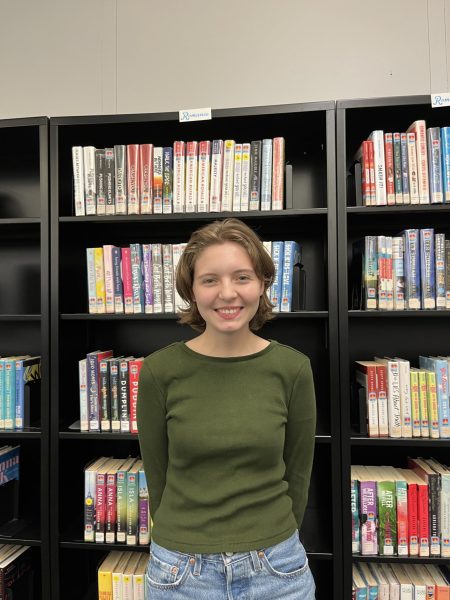Much Ado About Nothing: The Student Side
November 23, 2021
True love turns to disdain and back to love in Shakespere’s Much Ado About Nothing! The play follows the stories of Hero, played by Ella Laramore, and Claudio, played by Zach Henry, two characters who fall in love within first sight of each other, and Beatrice, played by Megan Miskovic, and Benedick played by Alina Dukala, two characters who disdain each other with what seems every fiber of their being. Everything seems to be going well for Hero and Claudio until another intrical character, Don John, played by Hans Herrera, tells Claudio something that wrecks his perception of his beloved Hero. What happens to true love then? Meanwhile, Beatrice and Benedick both swear that they will never marry. What happens, however, when they meet the right person? Both tales are beautifully interwoven and one of Shakespeare’s timeless works. Not only is Much Ado a timeless love story but a comedy as well! The play was performed on the 18th, 19th, and 20th of November at 7:30pm. The cast of Much Ado agreed to answer some questions regarding their experiences with performing Shakespeare.
When asked about how the actors understand their Shakespearean lines and make that message clear to the audience, Alina Dukala, a Junior who played Benedick, said, “As far as learning the language you tend to pick it up pretty fast. The most challenging parts to understand are the metaphors characters often make. Those can be a bit confusing, but I think I did a pretty good job of making my lines clear for an audience, by speaking and using my body in a way where you can get an idea of what I’m saying simply by my inflection and body movement.” Shakespeare’s language is not the only difficult part of the play but also the classical story it tells, Dukala expressed that it is beneficial to tell these older stories to better understand the history and the culture of that time period. Dukala also shared why they connected with their character saying, “I adore Benedict. I’m drawn to his goofiness, and the hilarity of the way he just CANNOT read the room to save his life”.
Kaitlyn Urbanowicz, is a freshman who played the role of Friar. When asked why this play is still relevant to modern audiences, she responded, “It has this whole concept of enemies to lovers, but there’s also love at first sight, and there’s a whole bunch of confusion and trickery between the characters. Overall, I think it’s stood the test of time and still has elements that make it a great story today” Urbanowicz also expressed that when trying to understand Shakespeare it is about more than just understanding what the words on the page mean saying, “Once we understand the meaning, it’s all about deciding how we portray that meaning and why it should be portrayed that way”.
Julie Salama, is a senior who played the role of Conrad. When asked what people should know about the show Salama said, “That it’s a romantic comedy. I’ll be honest I was a little devastated at first because I thought Don John’s plan would work.” They also expressed that when trying to understand Shakespeare, getting an overall summary of the plot helps to decipher what is happening on stage. Salama said that the set was one of the exciting aspects of performing. “I never imagined I’d be able to so much as understand Shakespeare, and now that I’m performing it, it’s kinda even more wild,” she added.
When asked why he was drawn to his character, Hans Herrera, a Junior who played Don John, responded, “He is evil without reason. John allows me to “hate” on stage, a level of maliciousness I haven’t shown before. He is excessive, cunning, and over the top. He does not care to fit in and does not care how he affects others.” On what keeps this show relevant to modern audiences Herrera replied, “It shows the power of rumors and family dynamics. Pretty much no one in the show is completely good, they lie, they accuse, they cheat, they abuse. But despite that we root for them. We see ourselves in it, we see how the characters act and despite their over the top decisions and willful ignorance, we see their humanity.”
Along with the cast, There is a huge crew that works to put shows together, from making the set to costumes and lighting, hours are put in behind the scenes, and the role stage managers have gives a unique perspective on a production. Ryan Dodd, senior, and Matt Kohl, junior, were the stage managers for this show. Dodd shared that the responsibilities of a stage manager vary from production to production, but for this show it was his job to take care of attendance, write down blocking for scenes and props that were needed, and handle related additional tasks. “During tech rehearsals, it is my job to mark cues down and set the programming of them in the script. Eventually, my role evolves to actually call the show through these cues, effectively ensuring lighting changes are smooth, and sound transitions happen.” When asked what draws him to being a stage manager, Dodd replied, “I have never acted, but I get to experience that and see what goes into it, and in addition, I get to put all my skills from lights and sound crew to use. It’s a cool culmination of skills that makes it super rewarding.” Dodd believes that one thing people should know about stage management is, “Although stage managers do not act, we still have to put a lot of time into the show. We have to attend as many rehearsals as possible, in addition to tech days”.
Matt Kohl shared why he chose to be a stage manager for this show “I was drawn to the idea of calling a show, being able to make decisions on pacing and provide creative input on the production,” said Kohl. He expressed that something people who are outside the world of theater should know about being a stage manager is, “It is a huge time commitment and it can be hard to find motivation at times, but the payoff of the final show always more than makes up for it.”
Music in a performance immerses you into the story fully. In this show a string quartet was with the actors on stage. Andrew Park, a Junior who plays violin, shared why music is so important to the show, “First off, music touches the emotional aspects of a story that cannot be expressed with words. Unsaid feelings can be conveyed simply through the playing of a single chord. It’s also used to help the audience remember certain themes by playing the same piece, or motif, multiple times in different places that each express the same theme. I really wanted to play for the show because I wanted to help add to the expression and emotion of the production in whatever way I could and it sounded really fun!” Said Park.
Matt Kohl, a Junior who plays cello, said, “As with any performance with music, it enforces the emotion of the actors and strengthens the message of the scene. Which is especially helpful in a Shakespeare play, where some clarity may be lost to today’s modern audience.” Kohl also expressed why he wanted to be a part of the ensemble saying, “To be perfectly honest, I wanted to play in the quartet as COVID had removed my previous chances to play in a production and I wanted to take every chance I could with my last 2 years at Glenbard South.” The music performed in the show were instrumentalized versions of modern pop songs that were sung and danced to throughout the show. The music for this show is a drastic constant to the language of Shakespeare as it is so modern, however the messages the songs convey help to bring the story alive. From the “Thank You Next” dance scene to “Girls like You” sung by some of the actors, the quartet allowed the message of the play to be conveyed on another level to the audience.
Overall, the performance was spectacular and all of the hard work students put into the show demonstrated their passion and love for theater. Much Ado About Nothing was clearly much ado about something for Glenbard South!
































